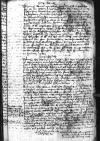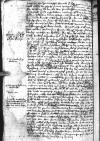Wir habenn Ewer Herlichkeit gutte zuniegung, / so diesulbte kegen unsernn ⌊brudern⌋ wegenn des dorfs ⌊Selostie⌋, negst / mit sunderenn wolgefallenn aus ihrem nehestenn ⌊⌋ / genugsam eingenomenn, / und habenn nicht nochgelossenn, / wie wir mit dem hernn ⌊pomerelischenn woiwoden⌋ zu ⌊Vormdit⌋ zusamen komenn sein, / mit seiner herlichkeit daraus zuredenn, / die wir ouch unserm boger noch nicht ungewilligt gespuret, / also das sein herlichkeit auf sich genomen [un]d erbottenn hat, gedochte sache mit fleis bei ⌊koninglicher majestet⌋ vortzustellenn, / damit die summa an gemeltenn gutte 80 guldenn aus sunderlichen koninglichenn genaden, / auf unser und des hernn pomerelischen wojwoden erbit, hocher an der vorpfendung gesugert ader, so die genade nicht wolt folgen, dassulbe gelt hernacher zum anderen vom unserm bruder abgelegt werde, ... das sich seine herlichkeit ... fastnacht auf den ... noch ⌊Crakow⌋ begeben, die summa auf ...lden sich erstrecke. / Welches, wen ess also vorschaft wirdt seinn, / wil alsdan sein herlichkeit nicht nach lassenn ferner wegen der vorschreibung anzuhaltenn, / das die auf unsers ⌊brudern⌋ lebenn in dersulben zeit durch keinem aus gemeltenn gutternn zu auszulossenn / gestalt werde, / auch alle brive und vorschreibung, / so duruber zuvor ausgebenn ader vorhanden, / darin cassirt und getadlet werden. / Vorhoffen uns derwegenn, / dieweil solchs der her ⌊pomerelischer wojwode⌋ zu sich genomenn, / es werde wol in der gestalt seinenn vortgang gewinnenn. / Der ...scher halbenn, / die von des hern ⌊pomerelischenn woiwoden⌋ vetter zu ⌊Pautzke⌋ seindt angehaltenn wordenn, / ist uns under andere... vielenn gescheftenn, die wir gehabt, / mit seiner herlichkeit zu redenn ent...genn, / worin dennoch nichts vorseumet ist, / den wir das teg... mit schriftenn bei seiner herlichkeit ausrichtenn kunnenn, / der ...ne, / wie wir uns vorshen, / solche unbilliche vornemen seines ... und burggrafen hinderen wirdt. / Dieweil auch Ewer Herlichkeit nebenn seinn brudern / und unserm swoger ⌊Georgen Manth⌋ / sunderlich vleisige vorbitte / vor ⌊Siluester Mei⌋ thun, / wollen wir darauf Ewer Herlichkeit nicht bergen, das gedochter Siluester etzlichenn flach[s] durch vorkauf besprochenn und zu sich gekauft , / derhal... ehr den erstlich vor unserm scheffer von etzlichenn ...serer ⌊burger⌋ zu ⌊Heilsberg⌋ ist boclagt , / da hin ernstlich ist bovolen wordenn, solchenn flachs in den merckt ... zu lassen / und keinen in dessulbtenn kauf zu hinderen, / ehr auch bei czwentzig marc / den gethanenn vorkaufen zuvorbussen, und nicht von dannen zu zihenn, / ist so arrestirt , welches alles unangeshen, / hat gedochter Silwester den vorkauf geholtenn, sich den... flachs lassenn zuwegenn / und in seine warszam genomenn, / arrest auch vorlassenn, und daraus vorlaufen, und sich nach ⌊Dantzig⌋ b.... Seindt des andern tags etzlich aus den ⌊radt unser stad ... ⌊Heilsberg⌋⌋ / zu uns zu schlosse komen, / und sich des alles beclagt, und darauf undertenniglich geboten, / sie bei der landordnung zuerhaltenn. / Also ist von unserm amptman obg... flachs, welches so manchfeltig genanter Siluester vorwir... hatt zu schlosse genomenn, / und nu aus unserm bovelich an die orter und stellen, / dahin man solche gutter zugeben pflegt, / ... mherenn teil vortelet und gebenn wordenn , das wenig davon vorhanden ist. Damit aber Ewrer Herlichkeit und der andern obangeczeigte bitt nicht vorgeblich bei uns sei angewandt, / haben wir vielgenante[n] Siluester , / der viel grosser straf vorschuldet, / nicht das im der eigent, / den ubrigenn fla..., so noch vorhanden, des vieleichte wirdt der vierdte teil sein, wie wirs achten, Ewer Herlichkeit halbenn / widder zuzueigenen unserm amptman be..., die ihm underrichtenn wollen, / das ehr sich nicht me... in iren dingenn, / die da widd... uns und die gemeine landsordnung sein, / einlosse, . Su... ist alhie in sachenn die auslosung der beidten dorffer zur ...len zum ⌊Culmen⌋ betreffende, / derhalben wir mit dem hern ⌊pomerelischen wojwoden⌋ zusamen kom... seindt, / nichts ausgerichtet worden, / sunder die ist von uns ... auf die negst komende ⌊tagfarth⌋ vorlegt. / Was bei uns von ...en zeitungen gewesen, / haben wir Ewer Herlichkeit von ⌊Smolein⌋ bei ein[em] stadtdiner vin ⌊Dantzig⌋ zugeschribenn. / Bevelenn Ewer Herlichkeit Gote dem almechtigen, / der diesulbte in langweriger gesuntheit erhaltenn wolle. /

